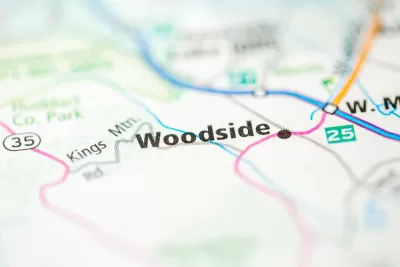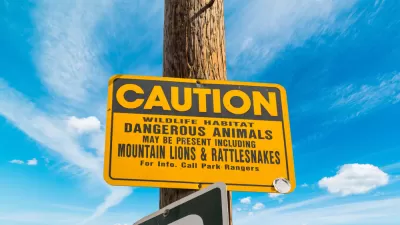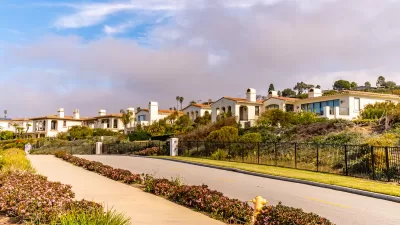Woodside, a small town in the South Bay Area of California, has invented a new method for resisting state-mandated zoning reforms.

Angela Swartz reports from Woodside, California, a town of 5,500 people in the South Bay Area, about the city's plans to reject the state's new zoning law, Senate Bill 9. Woodside's reason for avoiding state mandated density: the entire town is mountain lion habitat.
Planetizen readers know the beginning of this story: SB 9, approved in September 2021 before going into effect at the beginning of the year, allows residential property owners throughout the state to split their properties and build up to four residential units. With the law, California followed Oregon as the second state to preempt local zoning laws by mandating the end of single-family zoning. Local jurisdictions are taking similar actions, led by the city of Minneapolis in 2019 and followed by a wave of cities like Charlotte, Berkeley, and Sacramento, to name a few examples from 2021.
Cities in both Oregon and California have already been getting creative in resisting the new state preemption—using the tools of historic preservation, for example—but the city of Woodside chose a different route.
According to Swartz:
Town officials found a clause in the law that prohibits development in areas identified as habitats for protected species. Mountain lions are a protected species because they are a candidate for the California Endangered Species Act and Woodside, in "its entirety" is a mountain lion habitat, according to a Jan. 27 memo from Town Planning Director Jackie Young.
Swartz also provides background on the town's development politics and notes that the city is facing the prospect of needing to zoned capacity for 358 units between 2023 and 2031 under the state's Regional Housing Needs Allocation process. The town is currently updating its Housing Element.
FULL STORY: Woodside freezes SB 9 projects, citing an exemption for mountain lion habitats

Manufactured Crisis: Losing the Nation’s Largest Source of Unsubsidized Affordable Housing
Manufactured housing communities have long been an affordable housing option for millions of people living in the U.S., but that affordability is disappearing rapidly. How did we get here?

Americans May Be Stuck — But Why?
Americans are moving a lot less than they once did, and that is a problem. While Yoni Applebaum, in his highly-publicized article Stuck, gets the reasons badly wrong, it's still important to ask: why are we moving so much less than before?

Using Old Oil and Gas Wells for Green Energy Storage
Penn State researchers have found that repurposing abandoned oil and gas wells for geothermal-assisted compressed-air energy storage can boost efficiency, reduce environmental risks, and support clean energy and job transitions.

Minneapolis Bans Rent-Setting Software
Four cities have enacted restrictions on algorithmic software that can inflate rent costs.

Oakland to Add 244 New EV Chargers
Oakland plans to launch its new charging network at eight locations by the end of 2025.

Jane Goodall Inspires with Message of Hope, Resilience, and Environmental Action
Speaking in Pasadena, Jane Goodall offered a hopeful and inspirational message, urging global compassion, environmental responsibility, and the power of individual action to shape a better future.
Urban Design for Planners 1: Software Tools
This six-course series explores essential urban design concepts using open source software and equips planners with the tools they need to participate fully in the urban design process.
Planning for Universal Design
Learn the tools for implementing Universal Design in planning regulations.
Heyer Gruel & Associates PA
City of Moreno Valley
Institute for Housing and Urban Development Studies (IHS)
City of Grandview
Harvard GSD Executive Education
Salt Lake City
NYU Wagner Graduate School of Public Service
City of Cambridge, Maryland





























